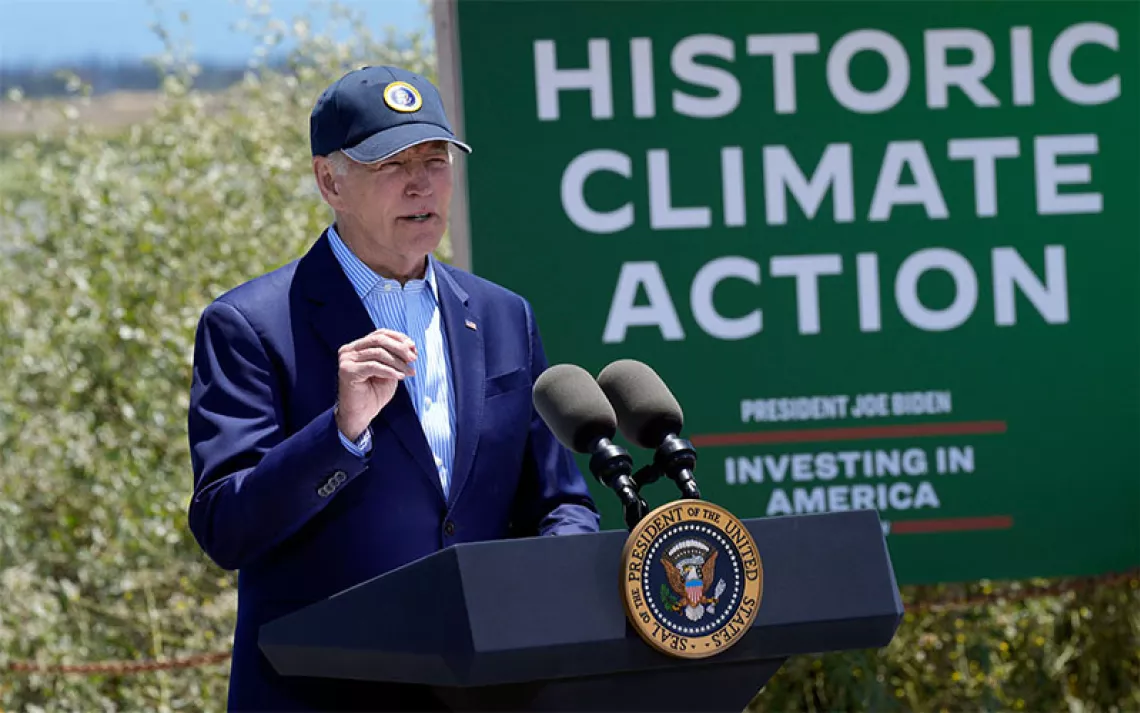What Are the SEC Climate Rules?
Financial regulators are hoping to force big companies and investment managers to disclose climate information

Photo by iStock/Tanaonte
The shocking announcement from Senator Joe Manchin that he now supports a sweeping clean energy package quickly brought President Biden’s climate agenda back from the dead. If passed into law, the legislation will take a huge bite out of greenhouse gas emissions, but it won’t alone put the US on a climate-safe trajectory. Other tools will still be needed.
One particularly powerful regulatory lever that remains available rests with the US Securities and Exchange Commission (SEC), a federal agency that conducts oversight of financial markets. The SEC acts as a financial watchdog, protecting investors from market manipulation and fraud by enforcing financial securities laws.
In recent years, the surge in popularity of green investments, “net zero” emissions targets, and funds claiming to focus on environmental, social, and governance (ESG) goals, has buoyed hopes that global capital is getting serious about addressing climate change.
But it has also resulted in greenwashing, arguably allowing polluters to paper over business-as-usual operations with specious claims of environmental progress. It’s easy for a company to publish a glossy sustainability report or commit to taking climate action at some future date, but it’s incredibly difficult for the public to discern fact from fiction.
By at least one estimate, the entire universe of sustainable investments tops $17 trillion. But defining what “sustainable” means has been hard to pin down.
“Right now, the market is increasingly demanding clean energy and deforestation-free agricultural products. But there is so much greenwashing, so much deception, so much information being hidden, that people who want that to happen don’t have an easy way to accomplish it,” said John Kostyack, a consultant with the Sierra Club.
He cited a hypothetical young professional who gets a new job and wants to start a retirement account. They go to the company’s 401K options and select a fund that focuses on environmental, social, and governance principles, hoping their money will be put to work fighting climate change.
“Most people don’t have the sophistication to know that they’ve just accomplished zero for the climate because they are being deceived,” Kostyack said.
The SEC is hoping to get a handle on all the confusion, proposing new regulations that could have a big impact on how the world of finance treats the climate crisis.
One set of rules will require publicly traded companies to disclose their risks from climate change—threats to company operations from floods, for example, or potential supply chain disruptions. In addition, companies will need to disclose data on their Scope 1 and Scope 2 emissions, which refer to those that are emitted directly from operations (pollution from a smokestack) or indirectly from the use of electricity or from employee travel. Scope 3 emissions—those emitted by consumers of a company’s product—are a much more contested part of the new rules. The SEC proposed only requiring companies to file that information if it is “material,” or if the company has already explicitly announced a Scope 3 target. Companies will also need to submit details on how they plan on meeting their climate targets.
The objective is not only to provide investors and the public with more information but also to standardize it in a way that is comparable.
“Today, over 90 percent of Fortune 500 companies have some kind of climate disclosure on their website, but they use different methodologies. So, it is impossible if you are customer, if you are an investor, if you are an employee, to really compare,” said Steven Rothstein, managing director the Ceres Accelerator for Sustainable Capital Markets, a nonprofit that focuses on sustainability in financial markets. “The free market can work, but only with good information. Right now, there is an asymmetry.”
While that first set of rules looks at company disclosures, a separate set of SEC regulations will be aimed at investment asset managers and their ESG strategies.
The so-called ESG disclosure would lay out rules on what exactly an ESG fund means and additionally will force major investment managers to reveal a ton of information about the extent to which they are financing polluters, how exposed they are to the financial risks of climate change, and even to what degree they are pushing companies to clean up their act (or not).
“What really matters here is the big assets managers, and it's really important to distinguish the really big guys who manage a large percentage of the stock market and the many, many other smaller asset managers,” Kostyack said, adding that mega-firms like BlackRock, Vanguard, and State Street loom large. “They get to make big decisions, including how hard to push companies to shift their investments. They have enormous clout under our system. The question is, are they exercising that clout according to the wishes of their clients?”
He said the “real big prize” will be information on “financed emissions,” which are the emissions associated with the polluting industries that banks and private equity firms invest in and lend to. Major institutional investors themselves have small carbon footprints—energy used in corporate offices and air travel for employees, for example, but not much else. However, that pales in comparison to the carbon impact of their investments. Large asset managers are responsible for a massive slice of the world’s greenhouse gas emissions because they essentially fund the global fossil fuel system.
For years, major investors argue that they can do more good by maintaining their investments in polluting corporations because it gives them a seat at the table. As shareholders or lenders, they can nudge oil companies to clean up their act, the argument goes.
The new rules from the SEC could shed light on whether this is true. “If the asset manager says, 'We are in Exxon, but we're really pushing them to invest in renewables.' Well, we might get a disclosure now that says they have actually done nothing to push Exxon to switch over to renewables,” Kostyack said. “We're finally going to see some evidence on whether or not they're actually doing anything. Because so far it doesn't look like Exxon is moving hardly at all.”
Importantly, companies and asset managers can’t engage in corporate spin or greenwashing in regulatory filings. “Because they are filing it with the SEC, they can't lie,” Kostyack said. And it will all be publicly available.
The public comment period for company climate disclosure rule has ended, and the SEC is reviewing the comments. The comment period for the ESG disclosure rules ends in mid-August. Final rules are expected later this year or in early 2023.
There has been a lot of speculation about what federal regulations will hold up under a hostile Supreme Court clearly gunning for climate policies. But Rothstein said that the proposed SEC rules are at the core of the agency’s mission—protecting investors—and consistent with a long regulatory history.
“There are almost 90 years of precedent where the SEC has made financial disclosure decisions,” Rothstein said.
In addition, the thrust of the rules is aimed at providing markets and investors with information, not at regulating emissions. “This is a financial disclosure rule; it is not a climate rule,” Rothstein said. “Meaning, it does not say companies have to do certain things to reduce their emissions. It will say companies will have to disclose certain things, and then the market will make certain decisions.”
But will the SEC rules advance a climate agenda, as many activists hope?
Kostyack said climate disclosures in financial markets “go hand in glove” with actual climate action.
“The investors who are clamping down on fossil fuels and making it harder for the fossil fuel companies to raise money will effectively drive funds over to clean energy businesses,” he said. Accurate information will empower them as well as retail investors who want to put their money in good causes.
Rothstein phrased the SEC rules as, at a minimum, a prerequisite to climate action.
“Disclosure alone is not going to address the climate crisis that we are all in. However, you can't manage what you can't measure. Disclosure is only a first step,” he said. “Information alone won't drive the action, but the action can't be driven without better information.”
 The Magazine of The Sierra Club
The Magazine of The Sierra Club







